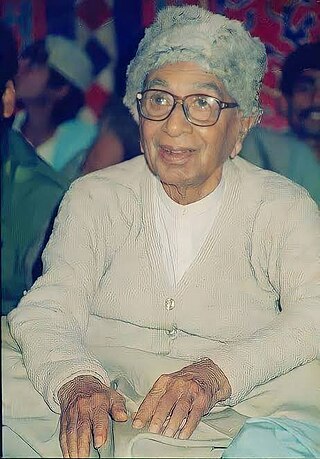Related Research Articles
Sindhis are an Indo-Aryan ethnolinguistic group, originating from and native to Sindh region of Pakistan, who share a common Sindhi culture, history and language. The historical homeland of Sindhis is bordered by the southeastern part of Balochistan, the Bahawalpur region of Punjab and the Kutch region of Gujarat.
Pakistan’s tradition of poetry includes Urdu poetry, English poetry, Sindhi poetry, Pashto poetry, Punjabi poetry, Saraiki poetry, Baluchi poetry, and Kashmiri poetry. Sufi poetry has a strong tradition in Pakistan and the poetry of popular Sufi poets is often recited and sung.

Shaikh Ayaz SI born Mubarak Ali Shaikh was a Sindhi language poet, prose writer and former vice-chancellor of University of Sindh. He is counted as one of the prominent and great Sindhi poet of Pakistan in general and Sindh in particular. He authored more than 50 books on poetry, biographies, plays and short stories in both Sindhi and Urdu languages. His translations of Shah Jo Risalo, which was written by the 18th-century Sufi poet Shah Abdul Latif Bhittai, from Sindhi to Urdu language established him as an authority in his domain.
Sindhi literature is the collection of oral and written literature in the Sindhi language in prose and poetry. The Sindhi language of the province of Sindh in Pakistan is considered one of the oldest languages of ancient India, and influenced the language of Indus Valley inhabitants. Sindhi literature has developed over a thousand years.
Nabi Bakhsh Khan Baloch was a Sindhi research scholar, historian, sindhologist, educationist, linguist and writer. He predominantly wrote in Sindhi, but also in Urdu, English, Persian and Arabic. He has been described as the "moving library" of the Pakistani province of Sindh.

Anwar Pirzada, was a journalist, columnist, writer and expert on Sindhi history, language and Shah Abdul Latif Bhittai's poetry.
Ustad Muhammad Juman was a Sindhi musician and classical singer from Pakistan, whose impact on Sindhi music is still pervasive.
Allah Bux Muhammad Umar Soomro, or Allah Baksh Soomro, was a zamindar, government contractor, Indian independence activist and politician from the province of Sindh in colonial India. He is considered to be amongst the best premiers of the province, known for promoting Hindu-Muslim unity and campaigning for an independent, united India. He was referred to as Shaheed or "martyr".
Tajal Bewas was born on 22 September 1938 in Village Dargah Pir Hayat Shah, Taluka Sobho Dero, Khairpur, Sindh. He was a Sindhi- and Urdu-language poet, novelist, short-story writer, teacher and government official. He died on 13 December 2008 due to brain hemorrhage in Karachi.
Imdad Hussaini was a Pakistani Sindhi poet and an Urdu language writer.

Ghulam Murtaza Syed, known as G. M. Syed was a prominent Sindhi politician, who is known for his scholarly work, passing only constitutional resolution in favor of the establishment of Pakistan from British India's Sindh Assembly in 1943. Later proposing ideological groundwork for separate Sindhi identity and laying the foundations of Sindhudesh movement. He is regarded as one of the founding fathers of modern Sindhi nationalism.
Dr. Adal Soomro is a Sindhi language poet and retired academic. He was Director Shaikh Ayaz Chair at Shah Abdul Latif University in Khairpur, Pakistan.
Ustad Bukhari Urdu, born "Punhal Shah", a name he later changed to Syed Ahmed Shah Bukhari, was a prominent progressive Sindhi-language poet of Sindh, Pakistan. His creative contributions in the field of poetry changed the thoughts of millions of people and he got recognition in whole Sindh and abroad. He was well known as the poet of the people and undoubtedly, he was, because he expressed his emotions in the language of common people. The Institute of Sindhology has opened a corner in its museum in his memory and honour.
Mohammad Ibrahim Soomro by his pen name Ibrahim Munshi Sindhi: محمد ابراهيم منشي) was a Sindhi-language poet and writer. He was born on January 15, 1934, in Janhan Soomro جنھاڻ سومرو, Tando Muhammad Khan, Hyderabad District, Sindh. He wrote seven books of poetry. He died on 31 July 2003.
Ustad Manzoor Ali Khan was a Pakistani singer belonging to the Gwalior gharana singing style, one of the oldest singing traditions in Hindustani classical music. Born in Shikarpur, Sindh, Pakistan, he was the first classical musician of the twentieth century who knew about the regional music of Sindh.
Mohammad Khan Majeedi was born on 5 January 1918 at village Shadman Jatoi, Taluka Mirpur Bathoro, Sujawal District. He was a nationalist poet in the Sindhi language. He died on 7 April 2003 in Sujawal.

The Thari also known as the Dhatti are an Indo-Aryan ethno-linguistic group who reside in the Thar Desert, which is divided between Pakistan and India. They speak Thari, also known as Dhatki language. Thari is also a geographical term, it refers to anything which belong or come from Thar desert. The Thari people live primarily in Tharparkar district of Sindh in Pakistan. In India, Thari speakers are found in western parts of Rajasthan.
Ishaq Samejo is a Pakistani poet, writer and literary critic of Sindhi Language.
Ayaz Gul is a prominent contemporary poet from Sindh, Pakistan. His works are in the indigenous Sindhi language. He was honoured with the Pride of Performance for literature by President Arif Alvi in 2021.
Hussain Bakhsh Khadim also spelt as Hussain Bux Khadim, was a Sindhi language folk singer and poet.
References
- 1 2 3 4 "Popular Sindhi poet Madhosh passes away". DAWN.COM. 27 June 2010. Retrieved 31 March 2019.
- 1 2 Services, Travel and Culture (27 June 2010). "Sindhi poet Madhosh passes away". Pakistan Travel & Culture. Retrieved 28 June 2019.
- ↑ "The Sindh Times". Archived from the original on 13 June 2017. Retrieved 7 January 2015.
- ↑ Daily Times Archived 8 January 2015 at the Wayback Machine